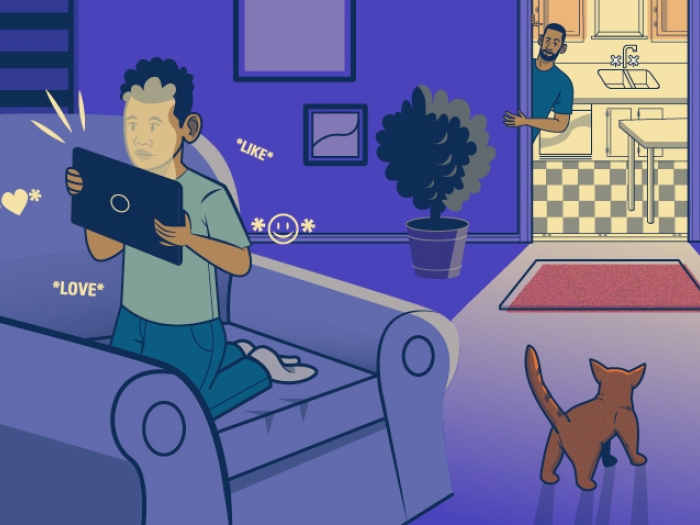After months of virtual activities being the norm, how can parents wean their children and families off screens this summer? An expert’s top advice.
10:03 AM
Author |

As we turn in our kids' Chromebooks and iPads back to schools, it may feel refreshing to have less technology in our houses. In fact, it's a great opportunity to look ahead into the summer and reset our family's relationships with screens and digital media.
Many families (mine included) had to immerse ourselves in technology during the COVID-19 pandemic to let our kids attend school, see their friends, check-in on grandparents and neighbors, go to work or try to escape from the multiple stresses of this year.
Some of this tech immersion felt satisfying and meaningful, and some felt like a waste of time. It's important to reflect upon both of these dynamics in your family, to choose the tech habits that you'd like to kick to the curb as life reopens.
Here are five ideas to help you with the process:
1. Consider what tech-free spaces and times you'd like back
To manage remote school and work, families needed to break some of our old rules and boundaries – such as no tech in the bedroom or at the dining room table. Many kids have had easy access to platforms that we never wanted them to explore, such as YouTube or social media, that can take up a lot of time or keep kids coming back again and again.
As you go on vacation or start summer camp, use this as an opportunity to put devices out of sight, plan a specific time of day to watch TV or movies together, and encourage kids to focus more on nature and people around them. Have family meetings and agree on some spaces that kids (and parents) won't use technology, such as in car rides, bedrooms and at the dinner table.
2. Pick the tech habits you'd like to continue
Have you started a weekly video chat with distant family? Have your kids discovered cool coding or digital art websites? Have you created new digital playlists or podcasts that you like to enjoy together? Make an effort to keep these up. These are great examples of kids getting their human and creative needs met through technology experiences.
MORE FROM MICHIGAN: Sign up for our weekly newsletter
3. Have a plan for replacing technology time
The hardest part about resetting family tech habits is that kids will complain. They will whine. They might yell and tell us we are the worst parent ever.
Understand that many kids have gotten in the habit of using high-pleasure, high-novelty videos and games, and the regular world can seem boring in comparison. A lot of tech design wants to suck kids in and make it hard for them to stop, so you may get what we call an "extinction burst" of bigger complaints when you try to change their tech use.
You can set yourself up for success by 1) having a replacement activity to do instead, that you know your child likes (e.g., cooking together, sports, swimming, board games, telling jokes, etc.); 2) keeping yourself calm and not escalating the argument; 3) having a scheduled time of day when they can do their favorite tech activity (even put it on the calendar) so they know they will have predictable access to it and won't be begging for it day and night.
4. Recognize the emotional role tech has been playing in your family
Technology can be really calming, and it has become part of our comfort zones as we have adapted to the stresses of the pandemic. Some children may be using videos to calm down at night, to avoid activities that stress them out, or because it just feels good!
As you try to change your family's media use, recognize where you may need to have other strategies for kids to manage worries, try new activities or calm themselves down.
5. Take baby steps to changing your tech routine
The digital world is still a bit like the "wild west" for kids right now, and is full of forces that are trying to keep kids' eyeballs engaged for long stretches of time (because this leads to more advertising revenue for tech platforms!) This can make parenting around media hard, but don't give up.
Instead, try:
-
Making small, intentional changes – like no phones in the car, or changing the content your child watches (e.g., less sassy YouTubers, more positive role models.)
-
Signing up for the parenting newsletter from Common Sense Media for ongoing tips and ratings.
-
Talk about your own tech use with your kids, and encourage them to show you what they like and don't like; communication with kids is the foundation of a healthy relationship with technology.
Change will always come easier if you do it as a family. Take a look at your daily schedule, or your phone's Screen Time output, and think about what you'd like to peel back on.
Talk to your kids about what your own "tech reset" will involve (less high-drama social media? Less evening binge-watching so you can get better sleep?) so that you can help them think critically about how technology affects our minds and bodies.
Like Podcasts? Add the Michigan Medicine News Break on iTunes, Google Podcast or anywhere you listen to podcasts

Explore a variety of health care news & stories by visiting the Health Lab home page for more articles.

Department of Communication at Michigan Medicine
Want top health & research news weekly? Sign up for Health Lab’s newsletters today!





